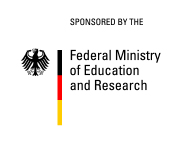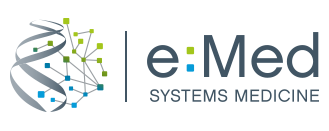People
CancerTelSys is an interdisciplinary research consortium that involves the project partners listed below.
Holger Erfle heads the ViroQuant-CellNetworks RNAi Screening Facility in the BioQuant Center and coordinates two consortia funded by the BMBF (SysTec) and the Baden-Württemberg foundation. He has
- established a novel microscopy-based RNAi Screening platform.
- developed several novel high-throughput and high-content technologies and methodologies.
- conducted and was part of several genome-wide RNAi screens.
Rainer König heads the research group Systems Biology of Sepsis at the Center for Sepsis Control and Care, Universitätsklinikum Jena. He is PI of the DKFZ/Israel project “A Systems-level Dissection of Telomere Biology”, a joint project with Martin Kupiec, Univ. Tel Aviv, coordinator of the initiative e:Bio – Innovationswettbewerb Systembiologie SYSMET-BC, project leader in MYC-NET (systems biology in cancer research, BMBF) and the neuroblastoma consortium ENGINE (NGFN/BMBF). His group has specialized on analyzing the regulation of cellular pathways. They developed
- a new pattern analysis device using Wavelets on grids for the analysis of breast cancer, neuroblastoma and the Alzheimer’s disease,
- a method to understand regulation of signaling pathways and
- tools to infer regulation of transcription factors.
Brian Luke (BL) is a group leader at the Institute of Molecular Biology (IMB) in Mainz. He has a long-standing history in genome stability and telomere biology and is currently a member of the AgeNet consortium in the BMBF GerontoSys II program. His laboratory is devoted to the mechanistic understanding of telomere function with respect to genome stability. He has
- recently performed a genome-wide/systems approach to understanding telomere structure and shown how its maintenance is critical to prevent cellular senescence,
- been involved in the initial discovery on the non-coding RNA, TERRA, at telomeres,
- has contributed to understanding how TERRA is regulated on the transcriptional and post-transcriptional levels, and demonstrated the cellular effects of de-regulated TERRA,
- is currently demonstrating how TERRA RNA:DNA hybrids are able to promote telomere elongation through homologous recombination (as it may occur in ALT-positive glioblastomas).
Website: https://www.imb-mainz.de/research/luke
Stefan Pfister (SP) is the head of the DKFZ Division of Pediatric Neurooncology. He initiated large-scale collaborative efforts focusing on the comprehensive molecular profiling of pediatric brain tumors within the framework of the PedBrain project of the International Cancer Genome Consortium (ICGC). He recently coordinated international research programs to detect genetic and epigenetic alterations in glioblastoma samples from patients across all ages. Current experimental strategies aim at elucidating the functional role of recurrent histone 3.3 mutations in pediatric and young adult glioblastoma patients and frequently associated mutations in the histone 3.3-specific chaperone complex (ATRX/DAXX) and TP53, as well as their impact on the glioblastoma epigenome and telomere maintenance. He
- has identified, validated, and tested predictive biomarkers for clinical application in different childhood brain tumors including medulloblastoma, ependymoma, pilocytic astrocytoma, and glioblastoma,
- is systematically testing novel drug targets in preclinical tumor models (in vitro and in vivo) based on the genetic/molecular signature of the individual tumor (“personalized oncology”),
- is currently analyzing the clonality within tumors, their respective metastases, and tumor relapses by ultra-deep next-generation sequencing techniques, and
- made seminal contributions to our understanding of the heterogeneity of glioblastoma across all ages, the potential cellular origins, and oncogenic pathways leading to gliomagenesis.
Website: http://www.pediatric-neurooncology.com
Christoph Plass is the head of the DKFZ Division Epigenomics and Cancer Risk Factors. He pioneered the first genome-wide screens for aberrant CpG island methylation in human malignancies and found tumor-type specific and non-random patterns of aberrant methylation. He co-coordinates the DFG funded Priority Program SPP1463 ‘Epigenetic regulation of normal hematopoiesis and its dysregulation in myeloid neoplasia’ and he is heading WP5 ‘The Prostate Cancer Methylome’ in the ICGC project on early onset prostate cancer. He
- has made major contributions to studies of aberrant DNA methylation in tumorigenesis,
- has shown with his group that human malignancies are characterized by extensive promoter CpG island methylation with non-random and tumor-type specific patterns,
- is elucidating the molecular mechanisms by which epigenetic and genetic alterations cooperate during the initiation and progression of malignant cell growth, and
- studies how environmental stimuli are processed by the epigenome and processed to the onset and severity of malignancies, as well as treatment response and treatment outcome.
Website: http://www.dkfz.de/en/tox/plass.php
Karsten Rippe is conducting interdisciplinary research that combines molecular/cell biology and physics to develop quantitative models that describe the relation between chromatin states like heterochromatin and telomeric chromatin and cellular functions. His research group is
- dissecting the ALT mechanism by applying a high-content imaging-based analysis and by ectopically inducing APBs,
- conducting cell biology studies to elucidate the dynamics and structure of PML nuclear bodies and their complexes with telomeres, and
- elucidating the mobility of telomeres in an ALT-positive human cell line.
Website: http://malone.bioquant.uni-heidelberg.de
Karl Rohr has a background in computer science and engineering. His research field is biomedical image analysis with focus on automated spatial-temporal analysis of cell microscopy images from large-scale high-throughput experiments. He and his group have developed a wide spectrum of new image analysis methods and algorithms, which have been successfully used in different applications. Computational approaches have been developed for
- segmentation and classification of cells from 2D and 3D microscopy images,
- 3D localization and colocalization of subcellular structures in multi-channel microscopy images (e.g., telomeres, PML-NBs, ER exit sites),
- tracking and motion analysis of cells and particles in live cell microscope image data,
- quantification of cell cycle phase durations and investigation of mitosis, and
- registration of cell nuclei for spatial normalization and accurate quantification of particle movement as well as analysis of nuclear organization.
Website: http://www.bioquant.uni-heidelberg.de/bmcv
Guido Sauter (GS) is chair of the Department of Pathology of the University Medical Center Hamburg-Eppendorf and a leading researcher in the field of molecular pathology and high-throughput tissue analysis. He
- pioneered studies of the HER2 proto-oncogene and its testing in several international trials including BCIRG005/006 and BETH.
- was part of the team that developed the tissue microarray (TMA) technique for high-throughput profiling large numbers of cancer specimen.
- is co-coordinator of the German ICGC (International Cancer Genome Consortium) project “The Genomes of Early Onset Prostate Cancer”.
- is one of the editors of the current WHO classification of genitourinary cancers.
Website: http://www.uke.de/institute/pathologie/index.php

